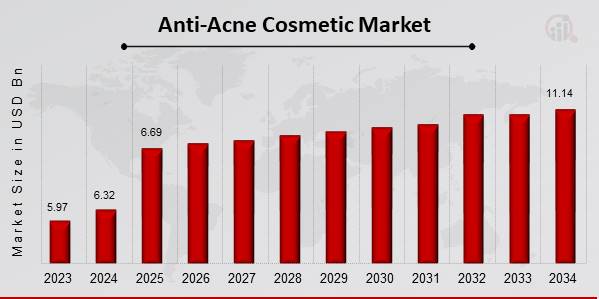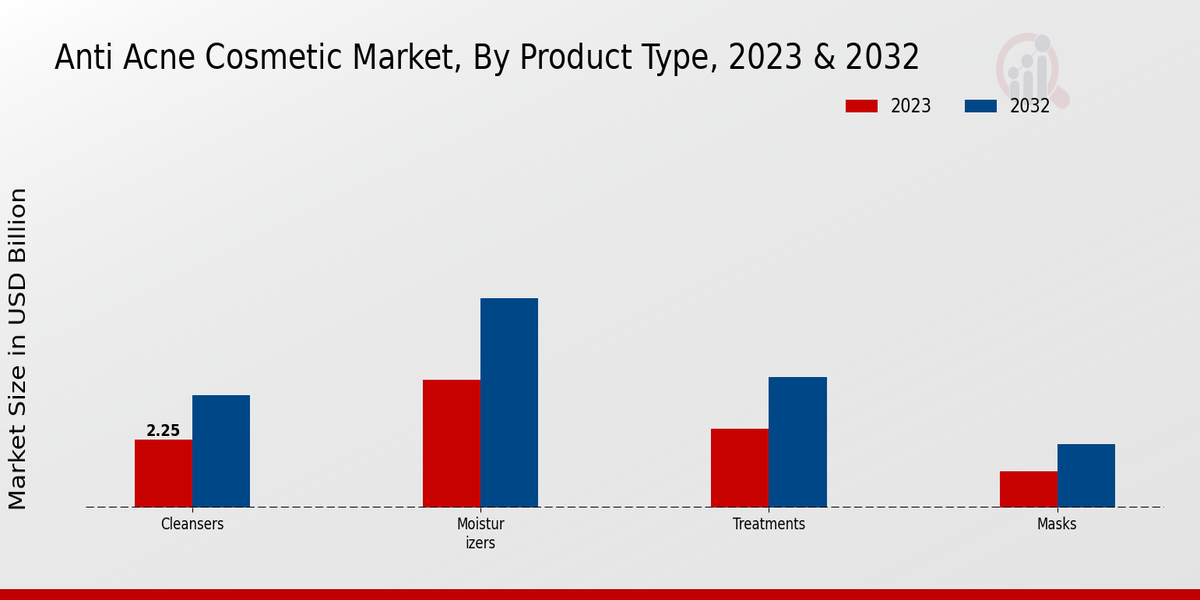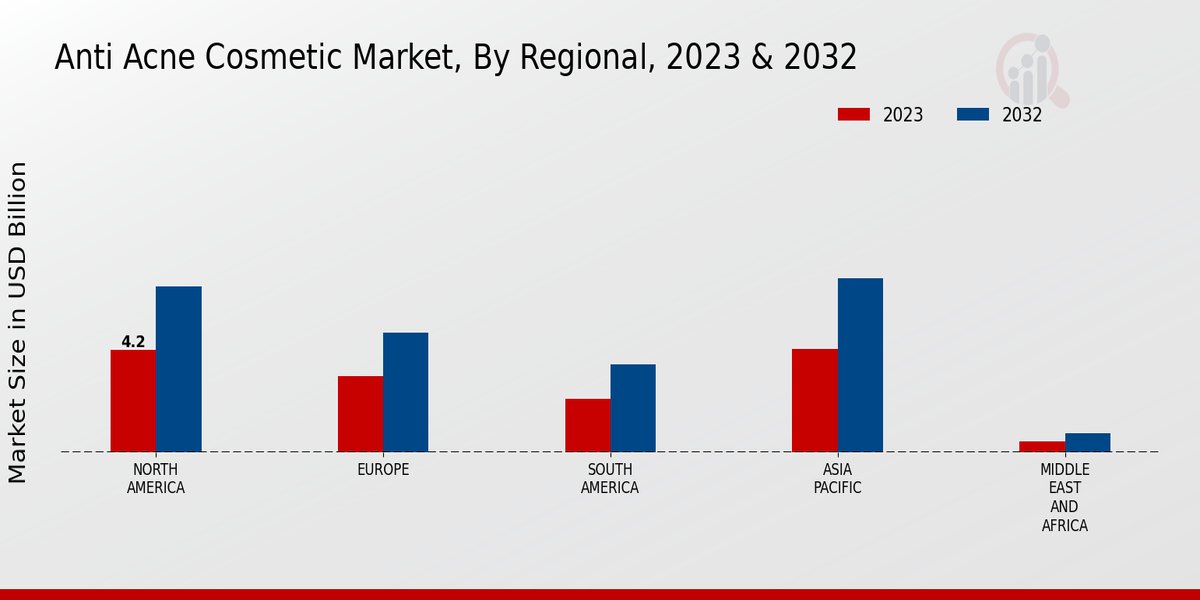Anti-Acne Cosmetic Market Overview
Anti-Acne Cosmetic Market Size was estimated at 6.32 (USD Billion) in 2024. The Anti-Acne Cosmetic Market Industry is expected to grow from 6.69 (USD Billion) in 2025 to 11.14 (USD Billion) by 2034. The Anti-Acne Cosmetic Market CAGR (growth rate) is expected to be around 5.8% during the forecast period (2025 - 2034).

Source Primary Research, Secondary Research, Market Research Future Database and Analyst Review
Key Anti-Acne Cosmetic Market Trends Highlighted
The Anti-Acne Cosmetic Market is witnessing an increasing demand on account of several factors that include growing skin health consciousness, income levels, and social media influence. Customers seek efficient and easy-to-use products for acne-prone skin. Hence, there is a shift towards self-medicated anti-acne products. Moreover, the growth of the market is attributed to technological developments, including novel formulation and delivery systems. This trend is likely to persist over the coming years owing to the rising trend of customized skin care products, the increasing penetration of e-commerce, and the geographical expansion of the market in developing countries.
Anti-Acne Cosmetic Market Drivers
Rising Prevalence of Acne Vulgaris
Introduction Acne vulgaris, popularly referred to as acne, is a chronic inflammatory skin condition that occurs when the development of pimples, blackheads, whiteheads, and cysts takes place. It is one of the most common skin disorders, affecting up to 85% of people in the world. In addition to the spread of the disease, the growing prevalence rate of acne vulgaris is one of the main drivers of the increasing anti-acne cosmetic market size. Factors resulting in the surge of such rates include the rise in hormonal changes, genetics, diet, stress, and air pollution.
Hence, the expanding number of victims avails an enabling environment propelling the growth in demand for efficient and safe anti-acne cosmetics.
Growing Awareness about Skin Health
In recent years, there has been a growing awareness of the importance of skin health and the role of skincare products in maintaining a healthy and youthful appearance. This has led to a surge in demand for anti-acne cosmetic products as consumers become more proactive in addressing skin concerns. The increasing availability of information about skincare through various channels, such as social media, online forums, and dermatological consultations, has contributed to the rising awareness about acne and its treatment options.
As consumers become more knowledgeable about the benefits of anti-acne cosmetic products, they are more likely to incorporate them into their skincare routines.
Technological Advancements in Acne Treatment
The Anti-Acne Cosmetic Market Industry is evidently growing on account of the significant developments that have been made in the area concerning the development of new active ingredients, improved formulations, and novel delivery systems. For example, salicylic acid, benzoyl peroxide, and retinoids are well-accepted for the treatment and prevention of acne. In addition to these therapeutic compounds, microencapsulation and nanotechnology have also been developed to facilitate targeted delivery and, hence, improve the effective concentration of these active agents.
Frequently, the prevalence of some active compounds used in these systems is not well tolerated due to various side effects, and technological developments have resulted in better-tolerated and effective acne-curing cosmetics.
Anti-Acne Cosmetic Market Segment Insights
Anti-Acne Cosmetic Market Product Type Insights
The Anti-Acne Cosmetic Market is segmented into product type, including cleansers, moisturizers, treatments, masks, and others. Among these, cleansers and treatments hold the largest market share. The growing consumer awareness regarding skin health and the increasing prevalence of acne have fueled the demand for these products. Cleansers are essential for removing dirt, oil, and makeup from the skin, which can help prevent acne formation. Moisturizers help keep the skin hydrated and prevent dryness, which can also help reduce the appearance of acne.
Treatments, such as topical retinoids and benzoyl peroxide, are used to treat existing acne and prevent future breakouts. Masks are another popular product type in the Anti-Acne Cosmetic Market. They are typically used once or twice a week to deep clean the skin and remove impurities. Masks can contain a variety of ingredients, such as clay, charcoal, and salicylic acid, which can help absorb excess oil, reduce inflammation, and kill bacteria. Other product types in the Anti-Acne Cosmetic Market include serums, toners, and scrubs. Serums are lightweight and concentrated formulas that are applied to the skin after cleansing.
They contain high levels of active ingredients, such as vitamins, antioxidants, and peptides, which can help improve the skin's appearance and reduce the appearance of acne. Toners are used to balance the skin's pH levels and remove any remaining impurities after cleansing. Scrubs are used to exfoliate the skin and remove dead skin cells, which can help prevent clogged pores and reduce the appearance of acne. The Anti-Acne Cosmetic Market is expected to continue growing in the coming years.
The increasing demand for natural and organic products, the rising disposable income, and the growing awareness of skin health are all factors that are contributing to the growth of this market.

Source Primary Research, Secondary Research, Market Research Future Database and Analyst Review
Anti-Acne Cosmetic Market Active Ingredient Insights
The Anti-Acne Cosmetic Market is segmented based on Active Ingredient into Salicylic Acid, Benzoyl Peroxide, Glycolic Acid, Tea Tree Oil, and Others. Among these, Salicylic Acid holds the largest market share due to its effectiveness in unclogging pores and reducing inflammation. Benzoyl Peroxide is another popular ingredient known for its antibacterial properties. Glycolic Acid, an alpha-hydroxy acid, helps in exfoliation and improving skin texture. Tea Tree Oil possesses anti-inflammatory and antimicrobial properties, making it a suitable ingredient for acne-prone skin.
The "Other" segment includes ingredients such as retinoids, sulfur, and azelaic acid, each with its own unique benefits in treating acne. The Anti-Acne Cosmetic Market is expected to reach a valuation of USD 6.34 Billion by 2024, exhibiting a CAGR of 6.1% from 2024 to 2032. This growth is attributed to the increasing prevalence of acne, rising consumer awareness about skincare, and the introduction of innovative products by market players.
Anti-Acne Cosmetic Market Application Insights
The Anti-Acne Cosmetic Market is segmented by application into Face, Body, and Both. Among these segments, the Face segment holds the largest market share due to the high prevalence of acne on the face. The Body segment is expected to witness the fastest CAGR during the forecast period owing to the increasing awareness of body acne and the availability of effective body acne treatment products. Both segment include products that can be used on both the face and body, and this segment is anticipated to grow steadily over the forecast period.
The growth of the Anti-Acne Cosmetic Market is attributed to the rising prevalence of acne, increasing disposable income, and growing awareness of personal grooming. Additionally, the availability of effective and safe anti-acne products is driving the market growth.
Anti-Acne Cosmetic Market Skin Type Insights
The Anti-Acne Cosmetic Market is segmented by skin type into oily, acne-prone, combination, and dry skin. Among these segments, the oily skin type is expected to hold the largest market share in 2023, owing to the increased production of sebum, which can lead to clogged pores and acne formation. The acne-prone skin type is also expected to witness significant growth over the forecast period due to the rising prevalence of acne vulgaris among the population.
The combination skin type, which exhibits characteristics of both oily and dry skin, is also expected to contribute to the growth of the Anti-Acne Cosmetic Market.
The dry skin type is expected to account for a smaller market share, as it is less prone to acne formation. However, the increasing demand for anti-acne products that are specifically formulated for dry skin is expected to drive the growth of this segment in the coming years.
Anti-Acne Cosmetic Market Target Group Insights
The Anti-Acne Cosmetic Market segmentation by Target Group includes Teens, Adults, and Both. Among these segments, Teens hold the largest market share due to the rising prevalence of acne during adolescence and increasing awareness about skincare. The demand for anti-acne cosmetics among teens is driven by factors like hormonal changes, stress, and exposure to environmental pollutants. Adults also represent a significant segment, as acne can persist or develop later in life due to hormonal imbalances, stress, or certain medical conditions.
Both segments cater to products suitable for teens and adults, addressing acne concerns across different age groups. The Anti-Acne Cosmetic Market revenue for the Teens segment is projected to reach USD 3.4 billion by 2024, while the Adults segment is expected to reach USD 2.9 billion. The combined market share of Teens and Adults is indicative of the widespread prevalence of acne and the growing demand for effective anti-acne solutions.
Anti-Acne Cosmetic Market Regional Insights
The regional segmentation of the Anti-Acne Cosmetic Market offers valuable insights into market growth dynamics across different geographical regions. North America holds a significant market share, driven by factors such as high disposable income, consumer awareness, and the presence of well-established players. Europe follows closely, with a robust market driven by advanced healthcare infrastructure and a growing demand for anti-acne solutions. The APAC region is poised for rapid expansion, attributed to rising consumer spending and increasing awareness about skin health.
South America and MEA also exhibit growth potential, with a growing population and increasing demand for effective anti-acne treatments. By understanding the regional nuances, manufacturers can tailor their strategies to cater to the specific needs of each region, ensuring market growth and customer satisfaction.

Source Primary Research, Secondary Research, Market Research Future Database and Analyst Review
Anti-Acne Cosmetic Market Key Players and Competitive Insights
Major players in the Anti-Acne Cosmetic Market industry are constantly trying to develop and launch new products that are more effective and have fewer side effects. Leading Anti-Acne Cosmetic Market players are also investing in research and development to improve their existing products and processes. The Anti-Acne Cosmetic Market is expected to witness significant growth in the coming years, owing to the increasing prevalence of acne and the rising demand for effective and safe acne treatments.
One of the leading companies in the Anti-Acne Cosmetic Market is Johnson & Johnson. The company offers a wide range of anti-acne products, including cleansers, toners, moisturizers, and spot treatments. Johnson & Johnson's products are known for their effectiveness and safety, and the company has a strong brand reputation. The company is also actively involved in research and development, and it regularly launches new products to meet the changing needs of consumers.
A major competitor to Johnson & Johnson in the Anti-Acne Cosmetic Market is Procter & Gamble. The company offers a range of anti-acne products under the Clearasil brand. Clearasil products are known for their affordability and effectiveness, and the brand has a strong following among consumers. Procter & Gamble is also actively involved in research and development, and the company regularly launches new products to meet the changing needs of consumers.
Key Companies in the Anti-Acne Cosmetic Market Include
Anti-acne Cosmetic Market Industry Developments
-
Q2 2024: Galderma Launches TWYNEO Cream in the U.S. for the Treatment of Acne Vulgaris Galderma announced the U.S. launch of TWYNEO Cream, a new prescription topical treatment for acne vulgaris, following FDA approval. The product combines tretinoin and benzoyl peroxide in a single formulation.
-
Q2 2024: Proactiv® Launches New Clean Acne Line Featuring Vegan and Fragrance-Free Formulas Proactiv introduced its new Clean Acne line, which features vegan, fragrance-free, and dermatologist-tested formulas targeting consumers seeking gentle anti-acne solutions.
-
Q2 2024: Curology Announces Expansion into Retail with Launch of Acne Cleanser at Target Curology, known for its personalized prescription skincare, announced the launch of its first over-the-counter acne cleanser, now available at Target stores nationwide.
-
Q1 2024: Neutrogena® Debuts Stubborn Texture™ Daily Acne Serum with Exfoliating Complex Neutrogena launched Stubborn Texture™ Daily Acne Serum, a new product formulated to address acne and uneven skin texture, expanding its Stubborn Acne product line.
-
Q1 2024: Hero Cosmetics Launches Rescue Balm +Red Correct, Expanding Post-Blemish Care Portfolio Hero Cosmetics announced the launch of Rescue Balm +Red Correct, a new product designed to address post-acne marks and redness, furthering its focus on post-blemish care.
-
Q2 2024: Murad® Launches Deep Relief Acne Treatment with Maximum Strength Salicylic Acid Murad introduced Deep Relief Acne Treatment, a new spot treatment featuring maximum strength salicylic acid, targeting consumers with persistent and severe acne.
-
Q2 2024: Peace Out Skincare Launches Retinol Face Stick for Acne-Prone Skin Peace Out Skincare launched a new Retinol Face Stick, formulated specifically for acne-prone skin, expanding its range of targeted anti-acne solutions.
-
Q1 2024: Differin® Expands Product Line with New Acne-Clearing Body Spray Differin, a brand known for its adapalene gel, announced the launch of an Acne-Clearing Body Spray, designed to treat acne on the back, shoulders, and chest.
-
Q2 2024: Paula’s Choice Launches 2% BHA Acne Spot Treatment Paula’s Choice introduced a new 2% BHA Acne Spot Treatment, expanding its portfolio of targeted solutions for acne-prone consumers.
-
Q1 2024: Versed Skincare Launches Game Over Acne Drying Treatment Versed Skincare launched Game Over Acne Drying Treatment, a new product formulated with sulfur and clay to target active breakouts.
-
Q2 2024: CeraVe® Introduces Acne Control Gel with 2% Salicylic Acid CeraVe announced the launch of Acne Control Gel, a new leave-on treatment containing 2% salicylic acid and niacinamide, designed for daily use on acne-prone skin.
-
Q1 2024: La Roche-Posay Launches Effaclar Duo+M, a New Anti-Acne Moisturizer La Roche-Posay introduced Effaclar Duo+M, a new moisturizer targeting acne-prone skin, formulated to reduce blemishes and prevent recurrence.
Anti-Acne Cosmetic Market Segmentation Insights
Anti-Acne Cosmetic Market Product Type Outlook
Cleansers
Moisturizers
Treatments
Masks
Other
Anti-Acne Cosmetic Market Active Ingredient Outlook
Salicylic Acid
Benzoyl Peroxide
Glycolic Acid
Tea Tree Oil
Other
Anti-Acne Cosmetic Market Application Outlook
Face
Body
Both
Anti-Acne Cosmetic Market Skin Type Outlook
Oily
Acne-Prone
Combination
Dry
Anti-Acne Cosmetic Market Target Group Outlook
Teens
Adults
Both
Anti-Acne Cosmetic Market Regional Outlook
North America
Europe
South America
Asia Pacific
Middle East and Africa
|
Report Attribute/Metric
|
Details
|
|
Market Size 2024
|
6.32 (USD Billion)
|
|
Market Size 2025
|
6.69 (USD Billion)
|
|
Market Size 2034
|
11.14 (USD Billion)
|
|
Compound Annual Growth Rate (CAGR)
|
5.8% (2025 - 2034)
|
|
Report Coverage
|
Revenue Forecast, Competitive Landscape, Growth Factors, and Trends
|
|
Base Year
|
2024
|
|
Market Forecast Period
|
2025 - 2034
|
|
Historical Data
|
2019 - 2023
|
|
Market Forecast Units
|
USD Billion
|
|
Key Companies Profiled
|
La RochePosay, Aveeno, Cerave, Mario Badescu, Clinique, First Aid Beauty, SkinCeuticals, The Ordinary, Proactiv, Paula's Choice, Kiehl's, Neutrogena, Drunk Elephant, Cetaphil
|
|
Segments Covered
|
Product Type, Active Ingredient, Application, Skin Type, Target Group, Regional
|
|
Key Market Opportunities
|
· Rise in Ecommerce Marketplaces
· Technological Advancements in Anti-Acne Products
· Increasing Focus on Skin Health
· Growing Awareness of Acne Treatment Options
· Expansion into Emerging Markets
|
|
Key Market Dynamics
|
Rising consumer demand for technological advancements, increasing awareness of new product launches, growing e-commerce
|
|
Countries Covered
|
North America, Europe, APAC, South America, MEA
|
Frequently Asked Questions (FAQ):
The Anti-Acne Cosmetic Market is expected to reach USD 11.14 Billion by 2034, exhibiting a CAGR of 5.8% during the forecast period (2025-2034).
Rising prevalence of acne, increasing awareness about skin care, and growing demand for natural and organic products are the key factors propelling the market growth.
North America is anticipated to lead the market due to the increasing disposable income and rising awareness about skin care in countries like China, India, and Japan.
Anti-Acne Cosmetics has an extensive application in cleansing, moisturizing, and treating acne-prone skin.
Key players include L'Oréal, Johnson & Johnson, Procter & Gamble, Unilever, and Beiersdorf.
Stringent government regulations, intense competition, and the availability of counterfeit products pose challenges to market growth.
The market is projected to exhibit a CAGR of 5.8% from 2025 to 2034.
The adoption of artificial intelligence (AI) and personalized skincare solutions are emerging trends shaping the market.
E-commerce is revolutionizing the market by providing consumers with convenient access to a wide range of products.
The market is segmented by product type, distribution channel, and region.

















